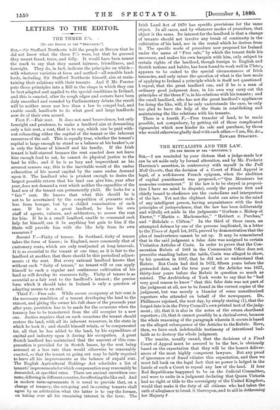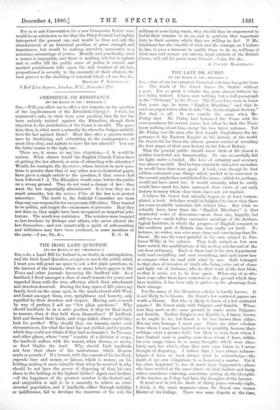TEE RITUALISTS AND THE LAW. (TO THE EDITOR OF THE"SPECTATOR."]
• am reminded by your dictum that a judge-made lair can be set aside only by formal alteration, and by Mr. Frederic Harrison's assertion, in controversy with myself in the Pall* Mall Gazette, that the decision of a Court of Final Appeal ia legal, of a well-known French epigram, when the abolition of capital punishment was proposed,—" Que Messieurs lea- assassins commencent." If the law is to be obeyed (a proposi- tion I have no mind to dispute), surely the persons first and chiefly bound to obedience are the custodians and interpreters-- of the law. Yet not the slightest doubt can arise in the mind of any intelligent person, having acquaintance with the first principles of jurisprudence, that the law has been deliberately and wilfully set aside in the judgments "Gorham v. Bishop of Exeter," "Martin v. Mackonochie," " Hebbert v. Purchas," and " Ridsdaie v. Clifton." In the third of these cases, an attempted defence by one of the persons implicated, in a letter' to the Times of April 1st, 1875, proved by demonstration that the
• of inadvertence cannot be set up. It may be remembered
that in the said judgment a false date was assigned to certain. Visitation Articles of Cosin. In order to prove that the Con- secration Rubric of 1661 in the Communion Office does not prescribe standing before the table, Cosin was alleged to show, by his question in 1687, that he did not so understand that Rubric. But eosin had died in 1672, fifteen years before the
date, and the true year of the Articles was 1627, thirty-four years before the Rubric in question so much as existed. The Archbishop of York wrote to say that he "had. very good reason to know" that this false date was not part of the judgment at all, nor to be found in the correct copies of the judgment, but was merely a blunder of some unauthorised reporters who attended on behalf of the newspapers. ]Jr. Phillimore rejoined, the next day, by simply stating (1), that the forged data is in the Privy Council's own printed text of the judg- ment; (2), that it is also in the notes of the sworn shorthand. reporters ; (3), that it cannot possibly be a clerical error, because the whole reasoning of the paragraph wherein it occurs is based on the alleged subsequence of the Articles to the Rubric. Here, then, we have such indefensible testimony of intentional bad- faith as to destroy the whole judgment.
The maxim, usually sound, that the decisions of a Final Court of Appeal must be assured to be the law, is obviously based on the expectation that they will be the honest deliver- ances of the most highly competent lawyers. But any proof of ignorance or of fraud vitiates this expectation, and then we must fall back on the legal fact that no power is lodged in the hands of such a Court to repeal any law of the land. If four Red Republicans happened to be on the Judicial Committee, and were to unite in a judgment declaring that Queen Victoria had no right or title to the sovereignty of the United Kingdom, would that make it the duty of all citizens who had taken the oath of allegiance to break it thereupon, and to aid in dethroning her Majesty?
For us to ask Convocation for a new Ornaments Rubric now, would be an admission so far that the Privy Council had rightly interpreted the present one, and would be thus not only the abandonment of an historical position of great strength and importance, but would be making ourselves accessories to a notorious miscarriage of justice. Morally and practically, such a course is impossible, and there is nothing left but to agitate and to suffer till the public sense of justice is roused, and merited punishment falls upon the real breakers of the law, proportioned in severity to the enormity of their offences, the next gravest to the shedding of innocent blood.—I am, Sir, &c., RICITARD F. LITTLEDUE.
9 Red Lion Square, London, W.C., November 27111.







































 Previous page
Previous page